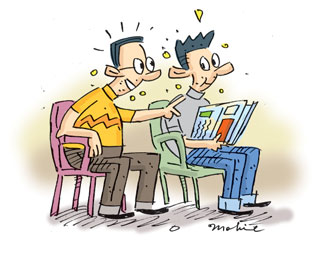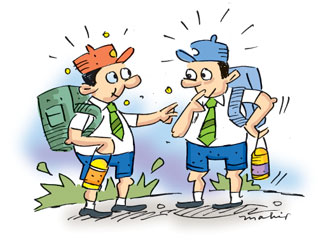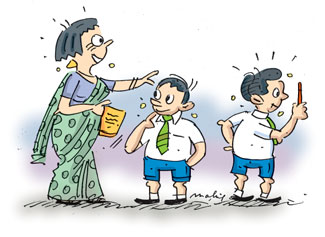|

by R. S. Karunaratne
Use of modals
Modals are a type of auxiliary (helping) verbs. Some of the modals
are: can, may, must, shall, will and ought.'Can' and 'may' are used to
ask for or give permission. 'May' is more polite and formal than 'can'.
May I use your phone, please?
Can I use your phone, please?
May I come in?
|

May I read your newspaper, please? |
Can I come in?
May I know your name, please?
Can I know your name, please?
May I go out, please?
Can I go out, please?
May I read your newspaper, please?
Can I read your newspaper, please?
You can go home now.
You may go home now.
You can watch the teledrama after dinner.
You may watch the teledrama after dinner.
You can take a break now.
You may take a break now.
We use 'can' and 'may' to express the possibility of an action or
event. 'May' shows a less likely possibility than 'can'.
You can use the boardroom after 3 p.m. (Definite possibility)
You may use the boardroom after 3 p.m. (slight possibility)
We can join the cricket team next year. (Definite possibility)
We may join the cricket team next year. (Slight possibility)
They can go abroad whenever they want. (Definite possibility)
They may go abroad whenever they want. (Slight possibility)
She can learn driving when she becomes an adult. (Definite possibility)
She may learn driving when she becomes an adult. (Slight possibility)
He can pick me on his way home.
(Definite possibility)
He may pick me on his way back.
(Slight possibility)
We use 'may' to suggest that we are
not very certain about something.
It may rain tomorrow.
He may help you to find a job.
She may phone you from Rome.
|

We can walk to school. |
They may give up eating meat.
We may visit Jaffna next week.
We use 'can' to show our ability to
do something.
We can walk to school.
They can dance well.
He can find his way to the public library.
She can pass the examination.
I can help you financially.
'May be', written as two words, is a verb.
She may be late as usual.
You may be selected to follow the
computer course.
We may be lucky this time.
'Maybe', written as one word, is an
adverb meaning 'perhaps'.
A: Is the principal in office?
B: Maybe.
A: Will you be able to pass the examination?
B: Maybe.
Note: When you do not wish to say 'yes' or 'no', say 'maybe'.
Activity
Tick the sentences that are correct.
Check your answers with the key.
1. You can ride a motorcycle?
2. Daddy, may I go to the library, now?
3. It may rain tomorrow.
4. Can help me write this essay?
5. You can be good at mathematics?
6. Sir, may I introduce my sister to you?
7. I may completed my essay next Tuesday.
8. You can stay underwater for a long time?
9. Can you repeat the answer, please?
10. Can I speak to the director, please?
Key:
1. Wrong 2. Right 3. Right 4. Wrong 5. Wrong 6. Right
7. Wrong 8. Wrong 9. Right 10. Right
Collective
Nouns
We use many collective nouns in writing. Look at the collective nouns
in column 'A' and fill the blanks with the relevant words given in
column 'B'.
[Column A]
1. A hail of ...............
2. A hand of .............
3. A herd of ..............
4. A horde of ..............
5. A host of ...............
6. A library of ...............
7. A litter of ...............
8. A mob of ..................
9. A muster of ..............
10. A nest of ................
11. An orchard of .............
12. An outfit of .................
13. A pack of .................
14. A peal of ..................
15. A plague of ..................
16. A posse of .................
17. A pride of ....................
18. A crop of ...................
19. A school of ..................
20. A set of ..................
21. A sheaf of .................
22. A shoal of ...................
23. A staff of ..................
24. A stud of ................
25. A suite of ..................
[Column B]
A. angels B. bullets C. clothes D. bells E. horses F. books G. fruit
trees H.
furniture I. teachers J. buffaloes K. herring L. lions M. machine-guns
N. papers O. peacocks P. pups Q. pears R. rioters S. savages T. bananas
U. whales V. golf clubs W. wolves X. policemen Y. locusts
Key:
1. B 2. T 3. J 4. S 5. A 6. F 7. P 8. R 9. O 10. M 11. G 12. C 13. W
14. D 15. Y 16. X 17. L 18. Q 19. U 20. V 21. N 22. K 23. I 24. E 25. H
Starters:
Use of 'got'
with 'has' and 'have'
In speech we can say 'has, has got, have, have got' without any
change in meaning.
In formal English, however, we usually drop 'got'.
Positive
I have got a pencil.
(First person singular)
You have got a pencil
(Second person singular)
|

Have you got pens? |
He has got a pencil.
(Third person singular)
We have got pencils.
(First person plural)
You have got pencils.
(Second person plural)
They have got pencils.
(third person plural)
Contracted form
I've got a pencil.
You've got a pencil.
He's got a pencil.
We've got pencils.
You've got pencils.
They've got pencils.
Question form
Have I got a pen?
Have you got a pen?
Has he got a pen?
Have we got pens?
Have you got pens?
Have they got pens?
Short answers to the above questions.
Yes, I have. (Positive)
No, I haven't. (Negative)
Yes, you have. (Positive)
No, you haven't. (Negative)
Yes,he has. (Positive)
No,he hasn't. (Negative)
Yes,we have. (Positive)
No,we haven't. (Negative)
Yes, you have. (Positive)
No, you haven't. (Negative)
Yes, they have. (Positive)
No, they haven't. (Negative)
More examples
I've got a car but I haven't
got a driver.
Mr and Mrs Jacob haven't
got a house.
This is a nice house but it
hasn't got a garden.
Have you got a telescope?
No, I haven't.
What have you got in
your briefcase?
I've got some important
documents.
Has Mary got a bicycle?
No, she hasn't.
In negatives and questions we can also use 'do / does + have'.
I don't have any children.
(I haven't got any children.)
This is a nice little office but
it does not have a window.
( It hasn't got a window.)
Does Jane have a house?
(Has Jane got a house?)
How much sugar do you have? How much sugar have you got?)
We use 'had' for the past tense.
I had a lot of friends in school.
You had a lot of friends in school.
He had a lot of friends in school.
We had a lot of friends in school.
You had a lot of friends in school.
They had a lot of friends in school.
Activity
Fill in the blanks with 'have got, has got, haven't got', or 'hasn't
got'. Check your
answers with the key.
1. They .............. two cars and a lorry.
2. Jim .................. a motorcycle but he has a bicycle.
3. I like Jayani. She .............. a lot of good qualities.
4. Mr and Mrs Perera ............ six children.
5. A dog ................ four legs.
6. I can't come to the party. I ............... a suitable dress.
7. Hurry up! We ................. much time.
8. What happened? I ............... my purse.
9. It's nice village but it .............. a cinema.
10. Maya is going to the dentist. She .................. toothache.
Key:
1. have got
2. has got
3. has got
4. have got
5. has got
6. haven't got
7. haven't got
8. haven't got
9. hasn't got
10. has got |

